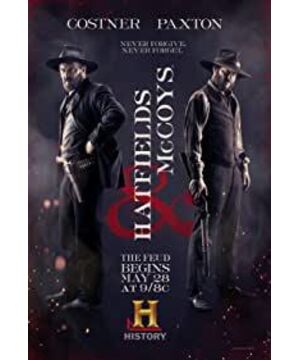The Heifetz family of West Virginia and the McCoy family of Kentucky have been locked in a bloody and protracted infighting, as the patriarchs of the two families, Anse Heifetz and Randall McCoy Yi had to bear the pain of the death of their relatives again and again - their sons and nephews took guns to the "battlefield" like soldiers, and gave their lives in this unnecessary infighting.
It sounds bloody, but this is what happened in American history. The History Channel, which has always been serious, certainly won't make it up. In this three-episode miniseries, director Kevin • Reynolds basically and objectively restored the historical original appearance of the hatred between Heifetz and McCoy family, but shifted the rhythm and focus of the narrative, thus successfully creating an attractive dramatic effect.
The main body of the story of "Blood Feud" takes place shortly after the end of the Civil War. Anse Heifetz and Randall McCoy were Confederate comrades on the battlefield, but Anse was wary, and when he saw that the situation was over, he deserted After slipping back home, the upright McCoy disdained Heifetz's actions. It was not until the Confederate army was completely defeated that he returned to his hometown on the banks of the tugboat from the prisoner of war camp. At this time, under the leadership of Anse, the Heifetz family's logging business was doing well, while the honest and friendly Randall was not familiar with business, but only diligently managed the family's farm work.
An inadvertent spat led to a bloody case between the two families, coupled with the unresolved economic disputes, which pushed the bloody wheel of revenge to roll back and forth between the two families, with a tooth for a tooth and blood for blood. , Neither of the two families refused to bow their heads, which made the war between the families intensified, and even led to the "Battle of Grape Bay" in 1888 - the two families fought hard and fought a cavalry gun battle no less than a regular army conflict. The family struggle To develop to this point, it can be regarded as the pinnacle.
Behind the bloody battle, there is actually a conflict between two life philosophies and two national characters: Comparatively speaking, the Heifetz family represented by Anse is more utilitarian and does not pay much attention to traditional morality. It seems that there is nothing that cannot be traded. Under the framework of the law, Anse can always use the means of safeguarding his own interests to the extreme, and Anse has always been non-religious and is a very realistic family leader; Randall is a pious A Christian, no matter what happens, prayer is a necessary procedure, and Randall is more stubborn. Compared with the selfish and shrewd Anse, Randall is clumsy, often for some "family honor" The false name caused a lot of anger—for example, in the pig-stealing dispute, Randall could never bear to impose such a "spoof" accusation on his family's head. As for the actual economic loss, it was Don't care that much.
This family "Blood Feud" took place not long after the end of the Civil War. When the Confederate army was defeated, Anse and Randall's completely different actions have actually revealed the difference in their outlook on life. What Anse represents is in essence the northern industry and commerce. The bourgeois value system, as long as the law allows it, should try to seize real interests as much as possible, protect themselves and maximize interests, and does not attach great importance to the "honor" of the spiritual world; Randall still adheres to the southern farm that was relocated The main character (the issue of black slaves is completely avoided in the play), raising pigs and farming, believing in God, disliking transactions, and even disliking the "cunning" Heifetz family - so, Randall resolutely banned his eldest daughter The Romeo and Juliet love with Anse's eldest son. To give an inappropriate example, the difference between Ons and Randall is a bit like the difference between Reid and Ashley in Gone with the Wind—especially Ons, nicknamed “The Devil”, and the notorious but down-to-earth, down-to-earth man. There is a bit of a resemblance between Bai Ruide, who dares to love and hate.
The family's "Blood Feud" even nearly triggered a civil war between West Virginia and Kentucky - no matter how bloody the two families shot, the legal systems at the state and federal levels are still functioning normally, and both sides are more using their own State law declares the other party "illegal," and then uses state law as the yardstick for brutal retaliation. This kind of primitive homomorphic revenge is obviously absurd, fighting for some trivial matters, and in the end both sides end up ruined, what is this for? With the deduction of the plot, the tragic color of "Blood Vengeance" has become more and more obvious - one after another of fresh lives passed away, and the fuse at the beginning was only for those useless struggles.
You have to let your heart break—be soft-hearted, back down, think for a moment from the other person's point of view, is there going to be this bloodbath? At the end of the series, Anse Heifetz is baptized, a devout Christian, and will spend the rest of his life atonement.
138 years after this feud ended, the sixth generation of the two families finally formally signed the peace agreement.
You have to let your heart break.
(Published in "Literature and Art" in September 2012)
View more about Hatfields & McCoys reviews











